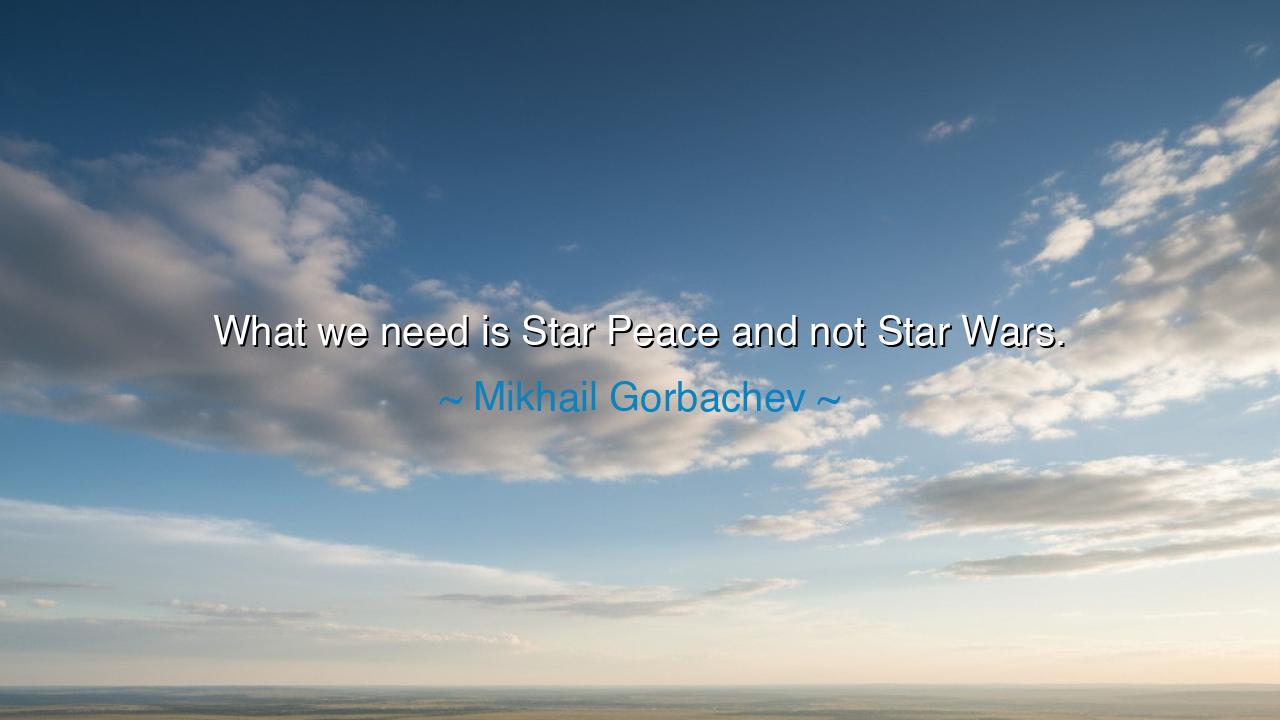
What we need is Star Peace and not Star Wars.






Mikhail Gorbachev, the last leader of the Soviet Union and a man who stood at the threshold of a new age, once declared with striking clarity: “What we need is Star Peace and not Star Wars.” These words were not the musings of a dreamer, but the urgent cry of a statesman who had witnessed the world tremble under the shadow of nuclear annihilation. With this phrase, Gorbachev sought to pierce through the frenzy of the arms race, reminding humanity that the stars above should not be filled with weapons of death, but with the promise of peace.
The origin of this saying lies in the 1980s, when the Cold War had reached a dangerous height. The United States under Ronald Reagan had announced the Strategic Defense Initiative, popularly known as “Star Wars,” a plan to build a vast missile defense system in space. Gorbachev, facing the weight of military escalation and the economic strain of the Soviet Union, rejected this vision of war among the stars. Instead, he offered a vision of Star Peace—a world where the vast resources of science and technology would be used not for destruction, but for cooperation, exploration, and the upliftment of humanity.
These words are heroic because they dared to imagine a different path at a time when fear and suspicion ruled. For centuries, nations had measured greatness by the power of their armies, the size of their arsenals, and the reach of their empires. Yet Gorbachev understood that in the nuclear age, such thinking led not to glory but to mutual ruin. Star Peace was not a fantasy—it was survival. It was the recognition that true victory lay not in the conquest of one nation over another, but in the preservation of life itself.
History offers us confirmation of this wisdom. The Cuban Missile Crisis of 1962 had already shown how close the world could come to destruction when war reached for the skies. For thirteen days, humanity teetered at the edge of annihilation, saved only by the courage of restraint. In contrast, when the United States and the Soviet Union finally began to reduce nuclear arms in the late 1980s and 1990s, a new era of cooperation and dialogue was born. The thawing of the Cold War, symbolized by the fall of the Berlin Wall, was itself a fruit of leaders who chose peace over escalation, dialogue over destruction.
Yet Gorbachev’s phrase speaks not only to nations, but to the human heart. For how often do we wage “wars” in our own lives—against neighbors, against colleagues, even against family—building arsenals of resentment and suspicion? What we need, too, in our personal lives is Star Peace: the ability to look beyond our battles, to see the vastness of the human soul, and to use our energy not to destroy, but to create, to reconcile, to build. Just as the nations of the earth must choose cooperation in the face of global peril, so too must each of us choose understanding in the face of division.
The lesson is clear: the future of humanity depends upon the choices we make with the power in our hands. We may pour our genius into weapons that threaten our existence, or we may pour it into endeavors that unite us—exploration of the cosmos, healing of the planet, advancement of knowledge. Gorbachev’s vision challenges us to rise above the narrow thinking of rivalry and fear, and to embrace the higher destiny of peace. The stars are not meant for war; they are meant to inspire us to dream, to wonder, to reach together for something greater than ourselves.
Practically, this means cultivating cooperation over conflict in every sphere: urging governments to pursue diplomacy before arms, urging societies to invest in education and innovation rather than destruction, and urging ourselves to choose reconciliation rather than vengeance in our personal conflicts. If we wish for a world of Star Peace, we must live it in small ways each day, sowing seeds of understanding in our homes, our communities, and our nations.
Thus, Gorbachev’s words endure as a torch for generations: “What we need is Star Peace and not Star Wars.” Let them remind us that the path of war among the stars leads only to darkness, but the path of peace leads us to light. For only when we choose peace will the heavens above shine not with weapons, but with the promise of a united humanity, reaching toward eternity together.






AAdministratorAdministrator
Welcome, honored guests. Please leave a comment, we will respond soon